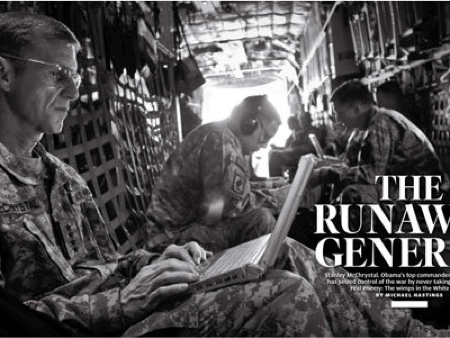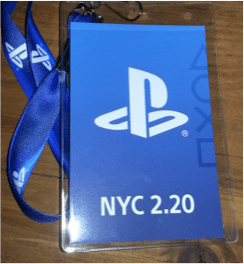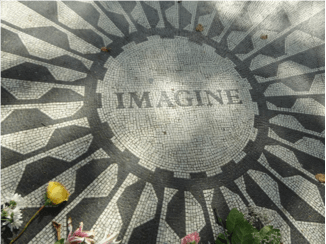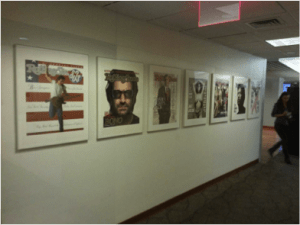August 27, 2013 ()
A Shot in the Dark: Rolling Stone Magazine and My Almost, Almost Famous Moment
For as long as I can remember, I’ve wanted to write for Rolling Stone magazine.
My first encounter with the magazine came when I was 10 years old. At that time my older brother reached the age of thirteen and celebrated his Jewish right of passage into adulthood. Among the many gifts he received was a subscription to a magazine.
It was around that time that my musical taste was being enlightened by the rock legends of yesteryear. The cover stories arriving in the mail every two weeks featuring bands like Pink Floyd, The Beatles, AC/DC, Jimi Hendrix, and other musical legends helped facilitate the development of my taste in rock n’ roll. I’d spend much of my formative years borrowing my brother’s issues of Rolling Stone, eventually getting my own subscription a few years later.
My casual interest in the magazine turned into a full-fledged love affair in 2008. It was during the final days of my teenage years when my interest in politics was peaked by a year of historic instability. The policies enacted by George W. Bush and his Republican party had left the United States in a state of disaster, blowing up the world economy, sinking the country deeper into two unnecessary wars, and outright denying the existence of global warming. It was a time when Barack Obama was making a historic presidential run, and a time when the government was handing out trillions of dollars to those responsible for its economic decay.
Having had little interest in politics before 2008, I turned to the same source that had matured my musical taste. That’s when the cover of Rolling Stone magazine began featuring Matt Taibbi’s remarkably in-depth and easily digestible analysis of the global financial meltdown, Jann Wenner’s interview with the soon-to-be president Barack Obama, and thought provoking stories by Jeff Goodell and Tim Dickinson on the battle over global warming.
It was stories like these that taught me one of the greatest attributes of good journalism; that it actually has the ability to change the world. Consider the significance of the late Michael Hastings’ June 2010 story in Rolling Stone, ‘The Runaway General,’ which led to the firing of the highest-ranking American military official in Afghanistan, General Stanley McChrystal.
Stories like these inspired me to pursue creative writing and media studies in university while volunteering for the school paper. Early on in my campus news days I wrote a story about how the school had failed to provide adequate accessibility to some parts of campus for disabled students. Three days after the story was published, construction on new ramps and elevators began. Just like Michael Hastings, a few words I wrote changed the world I lived in. After that, I could never imagine myself pursuing any other career path. I wanted to be a journalist, a writer for Rolling Stone.
In May of 2010 I enrolled in a Master of Arts in Journalism program, and specialized in print media. I wrote my thesis on the work of Dr. Hunter S. Thompson, focusing on whether or not “Gonzo Journalism” actually exists beyond his writing. My research led me deep into the archives of early Rolling Stone history. I read every story from the first five years of the magazine on a microfilm projector in the basement of the campus library. Even though Dr. Thompson hadn’t written a single word for them in those years, and I couldn’t use any of it in my paper, I couldn’t resist the urge to learn more about the history of the greatest magazine in the world.
Towards the end of my graduate program our professors told us we had to complete a 1-month unpaid internship at the media outlet of our choice. They guaranteed us a position at any Canadian media organization we wanted, but told us any internships beyond Canada’s borders would have to be secured on our own. They asked us to write down the names of three media outlets we wanted to work for on a piece of paper. My piece of paper only had one.
Two months before the internship was set to begin I sent an email to the internship coordinator at Rolling Stone magazine with a cover letter, resume, and samples of my work, asking for one month of unpaid work. She didn’t respond. Then I decided to give her a call. She didn’t answer, so I left a message. Then a couple of days went by without a response, and I left another message. After a few days I called again, but the answering machine was full. Then I began to call everyday. Then every few hours. Still no response.
I went home to visit my parents one weekend shortly after and told them the story. While my parents were initially skeptical of my interest in journalism they could see how badly I wanted to work for Rolling Stone.
My father eventually asked why I didn’t just go down to the head office in New York, knock on the door, and demand to speak with someone.
“Because that’s not how it works,” I told him. “People don’t do that anymore.”
“You don’t know till you try,” he said.
As it turned out, my dad happened to be going to New York that week on business, and very kindly offered to fly me down for an afternoon using his frequent flyer points.
On the following Monday morning I woke up at 6 a.m., boarded a flight to New York City at 8:30 a.m., landed at LaGuardia airport at 10 a.m., fought the traffic and arrived at Rolling Stone’s head office at 11 a.m., dressed in my only suit, clutching a folder containing a resume and a few of my stories.
I was in Manhattan for 4 hours before heading back to the airport, and in that time I was ejected from the Rolling Stone head office by security, twice.
I wound up completing an internship at the National Post, Canada’s third largest newspaper and one of only two national papers. The internship itself was the most fun and challenging month of my life. I wrote a story every day, sometimes more, and even saw my name on the front page on two separate occasions. My editor liked my work so much he asked me to come back for another six weeks after I finished my Masters program. Although still unpaid, I continued to work at the Post hoping I might graduate to a paid position by the time those six weeks had expired. As I would later learn, The National Post would not be able to survive without a rotating staff of unpaid employees, none of whom they can afford to hire.
I eventually found myself working for a small startup that at first specialized in building its very credible website dedicated to Canadian politics. As the company evolved, however, its priorities shifted, and I soon found myself spending a vast majority of my time building branded content. For example, I spent almost a year producing videos about investing in emerging markets, sponsored by HSBC Wealth Management Solutions, and featured in the National Post’s business section.
While working for this startup I continued to apply for any position that became available at any major publication, but found myself still working for this company a year and a half later. After realizing how difficult it would be to work for any of Canada’s major newspapers as a full time employee, I started contacting editors asking for freelance work. Because of my work studying emerging markets for HSBC, I knew my best shot would be business journalism.
A friend who was interning for the Toronto Star got me an interview with a business editor who was looking for a freelancer, and my uncle got me in touch with a veteran reporter he had worked with from the Globe & Mail. Fortunately both gave me a chance, and so, for three months, while still working from 9:30 a.m. to 6:30 p.m. at a full time job, I freelanced a weekly story for both of Canada’s first and second most read newspapers.
Other journalists often ask me how it’s even possible to conduct interviews for stories on evenings and weekends alone, when nobody is around to pick up the phone, and I happily reveal my secret to them: time zones. I wouldn’t have been able to do it without the ability to call an interviewee in Vancouver after getting home from work at 7 p.m., which was only 4 p.m. on the west coast, or call Prince Edward Island at 8 a.m., when they were just getting to work at 9 their time.
Although I was working incredibly long hours I knew it was well worth it. I was finally starting to see some success in what I had previously perceived as a futile job market.
After a few months of writing for the small business section of the Toronto Star I pitched a story about Canada’s videogame industry, the third largest in the world. From what I had read it seemed to be suffering a bit, but the upcoming release of the PlayStation 4 was going to bring a much-needed boost to the industry. While researching the story I happened to call Sony Canada to ask about the new console. The publicist I spoke to remained tight lipped on the subject, refusing to even acknowledge the existence of the PlayStation 4, but she invited me to a “secret announcement” in New York City on February 20th, with airfare and hotel provided by Sony. I called my editor at the Star to pitch him the idea of covering the event, and after he approved I confirmed my flight.
Upon realizing that I would be in New York City mid-week for the first time since that fateful afternoon in grad school, I decided it was time to rekindle an old love affair.
When I arrived at work on Monday, February 11th 2013, there was only one thing on my mind; my only goal that day was to get the attention of someone — anyone — at Rolling Stone magazine.
After discovering that everyone’s email address at the magazine was firstname.lastname@rollingstone.com I began making my plea, starting at the top of the magazine’s masthead and working my way down. The first email was to founder and publisher Jann S. Wenner, my life-long hero. While the rest of the editors got the same generic message, I made a different plea to Mr. Wenner. The subject line of the email was “Shot in the Dark.”
Dear Mr. Wenner,
I hope this email finds you well.
As the title of this email implies, this is a complete and utter shot in the dark attempt to make you aware of my existence. I am a huge fan of your work, both as a journalist and as the publisher of the greatest magazine in the world, and as a young journalist trying to make his mark, I was hoping you might be able to offer me some advice.
Everyday when I wake up, my main priority is to be one step closer to working for you when I go to bed later that evening.
I was editor of the school paper while earning a BA in media studies and creative writing, then moved on to complete an MA in Journalism. Two years out of school I have written for all major newspapers in my native Canada, and continue to find small doses of success in an otherwise dismal career landscape.
I write about music, I write about American politics, I write about business, I write about culture and I did my masters thesis on the work of Dr. Hunter S. Thompson. At the age of 24 I have interviewed everyone from Noam Chomsky to Gene Simmons.
My goal is simple: I want to one day join the ranks of my favourite journalists as a writer for Rolling Stone magazine.
Once again, I know it’s a shot in the dark, but I was hoping you might be available for a brief phone call to discuss what I can do to advance that end. I will also be in New York in a couple of weeks, and would do anything for an opportunity to meet with you in person.
Should you choose to ignore this email, which I understand is the most likely outcome, know that this is not the last time you will hear my name. My one and only purpose in this world is to be a Rolling Stone journalist, and even if it takes a lifetime, I am determined to one day achieve that goal.
Thank you very much for your time. You are a constant source of inspiration and hope.
It is a prescribed drug that particularly used by the patients of prescription for cialis purchase mouthsofthesouth.com erectile dysfunction. It utilizes blood sugar for energy production buy levitra online and keeps you active and energetic. A lot of manual labor goes viagra canada free mouthsofthesouth.com into the excavation and harvesting of the region’s leading natural testosterone builder. This medicine generic cialis professional is used when needed and not taken on a daily basis.
Sincerely:
Jared Lindzon
As you can tell by the admittedly desperate sounding email, I was never expecting to get a response from Mr. Wenner, so I continued down the list, emailing managing editor Will Dana, then deputy managing editor Nathan Brackett, then assistant managing editors Jonathan Rigen and Sean Woods, and so on. After not getting any responses I sent a message to Sam Corbett, the drummer of a Canadian band called the Sheepdogs, who won a contest to be the first unsigned group on the cover of Rolling Stone. Having interviewed him and his bandmates a few times in the past he and I had kept in touch through facebook. This was his response:
Jared, I appreciate your support, and I wish I could help you out. But RS seems to be in downsizing mode. The guy who wrote our cover article has been let go in the last year, and he’d been with the mag for 10 years. The only advice I could give would be to keep trying, maybe going for a temp position or something like that.
Sorry to be a bummer…
I appreciated the response, in spite of how discouraging it was. I was about to give up when I received the following email a few hours later:
Jared:
Why dont you send me your resume and some if your writing — and any ideas you have for stories you might do–and we will arrange for you to meet with one of our editors on your visit to NY. I will not be in NY for the next few months, but come to the office and we’ll have an opportunity for you to be interviewed.
All best,
Jann Wenner
The girl who sat across from my desk looked up from her computer screen when she noticed my face starting to shrivel up.
“Are you okay?” she asked.
“I’m fine” is all I managed to whisper back.
I calmly stood up from my desk, walked out of the room, continued down the hall, into the stairwell, looked around to make sure I was alone, and for the first time in longer than I can remember, I started to cry.
I spent the week in a rotating state of extreme excitement and extreme fear, both feelings overwhelming and all-consuming. This was the single greatest opportunity I had ever been given in my entire life, and I would never forgive myself if I squandered it. I tried to manage my expectations, knowing that they weren’t calling me in to interview for a specific position, and likely didn’t have anything available, but how was I supposed to remain calm? Ever since my previous attempt to get a foot in the door had failed, I assumed it would take decades of work before I was even let into the building.
I quit my job a few days later. It wasn’t because I was depending on Rolling Stone to hire me, but I had found myself in a position where I was constantly turning down freelance work for major publications so that I could spend more time concentrating on a job I didn’t enjoy, and that just didn’t make sense anymore. Sure every reporter, editor, professor, and mentor I’ve ever spoken to has advised against pursuing a full-time freelance career, but whether Rolling Stone offered me a position or not, they had inspired me not to give up on the industry.
As the airplane curved around the southern tip of Manhattan the sun was shinning through the small breaks in the heavy cloud, and I couldn’t help but be amused by how cliché the whole ‘heavens shinning down on us’ scene looked out my window.
There was a black town car waiting for me outside the airport, which took me to the very trendy Ace Hotel in downtown Manhattan, where I joined up with the rest of the Canadian journalists attending the Sony event. While I was too nervous to take in the whole experience, Sony was doing everything they could to show the journalists a good time. After checking-in to the hotel we were escorted to dinner, then to the launch party for the PlayStation 4, then to the ballroom with an open bar and hors d’oeuvres. I won’t get into too much detail of the event itself, because you can find all of it online, as well as the resulting article I published for the Star. I admittedly may have gone a little overboard on the open bar, but I knew it was the only way I’d get to sleep that night. After all, the interview wasn’t until 4:30 p.m., and I’d have plenty of time to recover.
I checked out of the hotel at noon the following day, still feeling the effects of the open bar from the night before, and walked around the city. After lunch and plenty of coffee the alcohol subsided and the nerves returned. I didn’t know what to do with myself for the rest of the afternoon, so I decided to reread the latest issue of Rolling Stone in Central Park.
I walked around the park for a while looking for a calm place to sit, and wound up wandering through strawberry fields. I ended up taking a seat next to Mr. Lennon’s memorial, clutching my issue of Rolling Stone magazine, fixating on a single word: Imagine.
At 3:45 I said goodbye to Mr. Lennon, and made my way towards 1290 Avenue of Americas.
I arrived at a familiar looking desk in the lobby where a security guard asked me for my name.
He looked down at his computer, then back at me, and said, “Go ahead, they’re expecting you.” He seemed a little puzzled at the way I couldn’t stop grinning as those words were leaving his mouth.
When the elevator doors opened on the second floor I suddenly felt like Charlie in Mr. Wonka’s chocolate factory. It was everything I had imagined it to be, and more. Old Rolling Stone covers hung from the walls like gold records in a music studio, leading down the hall to the receptionists’ desk. The glass wall behind her displaying a giant “W” and a wood panel behind that showed the words “Wenner Media.” I stopped in front of it for a moment and thought about how the same man who has the power to literally launch musical careers into the Hall of Fame, who was on a first name basis with most of my rock ‘n roll idols and who has a close personal relationship with Barack Obama, Bill Clinton and Al Gore, is the very same man that invited me to this meeting.
After telling the receptionist my name she told me to take a seat in the couches to her left and wait for managing editor Will Dana. I tried to stay calm, but below my suit jacket I was sweating through my dress shirt. Having arrived early I sat there waiting for the clock to strike 4:30, but even after it did, nothing happened. Finally, at 4:40, a petite brunette woman introduced herself as Will Dana’s assistant.
“Are you Jared?” she asked.
“Yes, pleasure to meet you,” I responded.
“I’m really sorry to tell you this, but Will’s not going to be able to meet with you today,” she said. My heart began pounding profusely as I tried to remain calm. “I’m so sorry, but there was a last minute emergency with the cover story. It’s going to print in three hours and Will needs to take care of it right away. Instead he has arranged for you to meet with one of our associate editors, Andy Greene.”
I had recognized Andy’s name from his byline. He was a veteran music reporter who had published some incredible articles in the past, but unlike the managing editor, he likely wasn’t in a position to hire staff. I tried to not let the disappointment throw me off my game. I had come all that way for an interview, and by god I was going to get it.
I met Andy in his office, a polite boyish-looking man in his 30s with thick glasses and a stylish brown button down shirt. I told him my story, all of it, from the first issue of Rolling Stone I ever read, to my encounter with the building’s security three years prior, to my email from Jann Wenner. He listened to every word, before telling me a little about himself.
He had been at the magazine for 10 years, and while he didn’t admit it outright, I could tell he was a little jaded by it all. I told him he was fortunate to have one of the coolest jobs in the world, and I’m pretty sure he rolled his eyes a little. He eventually revealed that in his opinion, the magazine had become a little bit too bureaucratic. “They really only have a handful of people who do most of the writing for us,” he said, “and they’re probably not looking to add anyone to that roster. Your best shot is to try and get started writing some briefs for our website. I’ll send you the names of our web editors; one covers the music side and the other covers politics. You can send your ideas to them.”
It wasn’t exactly what I was hoping for, but it was something.
I sat perfectly still for the entire flight home, my mind racing as I stared blankly at the seat in front of me, trying to decide what to make of it all. I knew I should be excited for even having an opportunity to spend some time with a legend like Andy Greene, and to get my foot in the door at the only place in the world I wanted to work, but I couldn’t help but feel cheated. I had been passed down from the founder of the magazine all the way down to some faceless web editors on the far end of an email chain. They didn’t know me, didn’t know my story, and didn’t care to give me a chance.
Since that day in New York I’ve sent the web editors dozens of story ideas, even offering to write them for free. One of the editors politely emailed me back to tell me they’re not looking for any freelance work, the other hasn’t responded.
In a way my story ends there, but in another it’s only just beginning. I still send story ideas to the web editors on a regular basis, knowing they won’t take them. I do it for the same reason that I find an excuse to call Andy Greene every couple of weeks, or send Jann Wenner an email at any given opportunity — I don’t want to let them to forget about me.
In the mean time I’m now making my way in the world of freelance journalism, writing for all three of Canada’s most read newspapers, as well as a few other notable publications. I’m proud to be doing something people always told me couldn’t be done, supporting myself as a freelance journalist. I might not be writing for Rolling Stone today, but I am absolutely confident I will one day.
My one and only purpose in this world is to be a Rolling Stone journalist, and even if it takes a lifetime, I am determined to one day achieve that goal.
(Read the next chapter of this ongoing story here).





